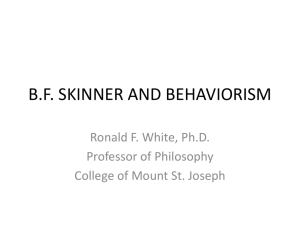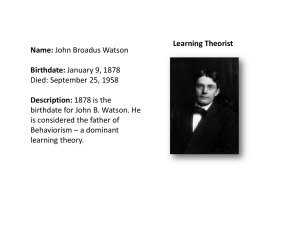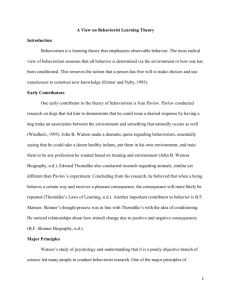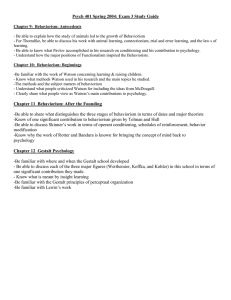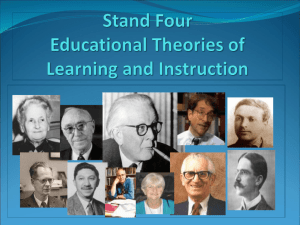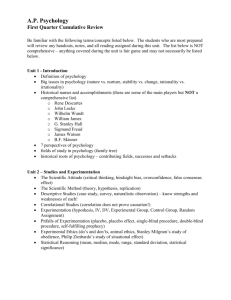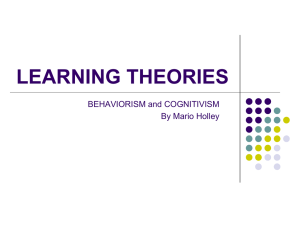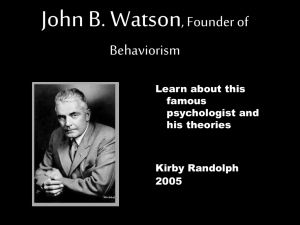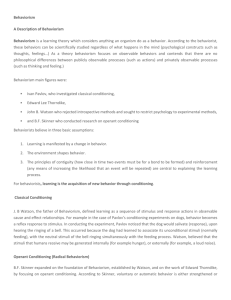Behaviorism - Cambrey Bean
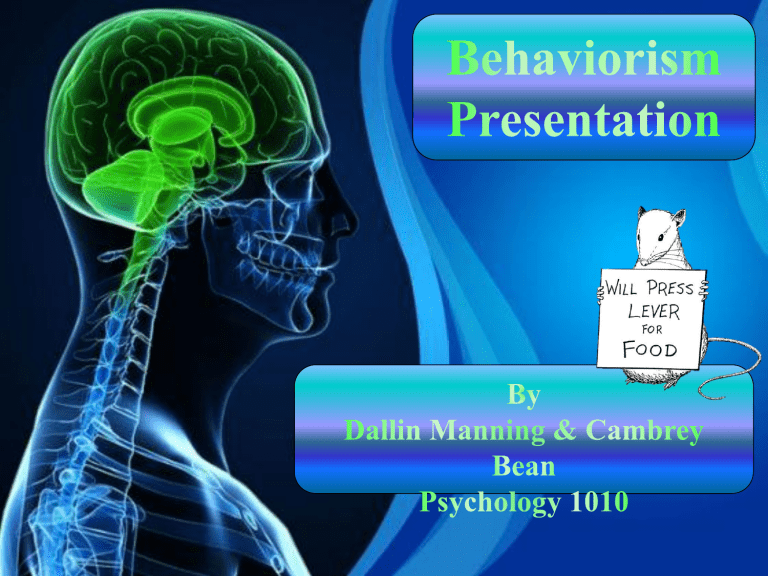
John Broadus Watson was born in 1878 in
Greenville, South Carolina. He earned his Bachelor's degree at the University of Chicago, and In 1903 he received his doctorate and later became an associate professor of psychology at Johns Hopkins University.
John Broadus Watson proposed the idea of an objective study of behavior called
"behaviorism." He saw psychology as the study of people's actions with the ability to predict and control those actions. This new idea became known as the behaviorist theory.
Antecedent Conditions Behavior Consequences
Watson coined the term “Behaviorism” in 1913.
Stimuli Response
Neutral
Effect
Behaviorism assumes that behavior is observable and can be correlated with other observable events. Thus, there are events that precede and follow behavior.
Behaviorism's goal is to explain relationships between antecedent conditions, behavior, and consequences as shown to the left.
In his earlier research Watson used animal subjects and later shifted to the study of human behaviors and emotions. He wanted to develop techniques to allow him to condition and control the emotions of human subjects.
Watson’s Behaviorism
Theory
Watson's theory was more concerned with effects of stimuli.
He derived much of his thinking from Pavlov’s animal studies
(classical conditioning). this is also referred to as "learning through stimulus substitution," a reference to the substitution of one stimulus for another. For example, the ringing of a bell eventually produced the same response as food for Pavlov's dogs.
Skinner Box
Developed by B. F. Skinner, a Skinner box is a chamber that contains a bar or key that an animal can press or manipulate in order to obtain food or water as a type of reinforcement. The Skinner box also had a device that recorded each response provided by the animal as well as the unique schedule of reinforcement that the animal was assigned
Burrhus Frederic Skinner (3/20/1904 – 08/18/1990) was an
American psychologist, behaviorist, author, inventor, and social philosopher. He was a professor of Psychology at
Harvard University from 1958 until his retirement in 1974.
Skinner invented the operant conditioning camber, innovated his own philosophy of science called radical behaviorism, and founded his own school of experimental research psychology—the experimental analysis of behavior.
“All we need to know in order to describe and explain behavior is this, actions followed by good outcomes are likely to recur , and actions followed by bad outcomes are less likely to recur.”
(Skinner, 1953)
The key to all behaviorism is determined by learning and reward.
Classical Conditioning
–
You eat a new food and then get sick because of the flu. However, you develop a dislike for the food and feel nauseated whenever you smell it.
Operant Conditioning
–
Your car has a red, flashing light that blinks annoyingly if you start the car without buckling the seat belt. You become less likely to start the car without buckling the seat belt.
Classical Conditioning: Something that is automatic
Operant Conditioning: Something that is voluntary
Margaret Floy Washburn (1871-1939) was an animal behavior specialist. She was a student of Edward Titchener at
Cornell University. Washburn was the first woman with to graduate
. with a PhD in Psychology.
Margaret Washburn is best known for her influential textbook called,
The Animal Mind: A Textbook of
Comparative Psychology.
The Animal Mind was published in 1908, this book compiled research on experimental work in animal psychology. Within her book are a range of mental activities, beginning with the senses and perception, including hearing, vision, and tactual sensation. The later chapters of The Animal Mind focus upon consciousness and higher mental processes. However, the dominant focus of
Also noteworthy is her introductory chapters, which detailed methods of interpreting the results of animal research. Although she was cautious about attributing meanings to animal behavior and realized that animal consciousness could never be directly measured. She suggested that animal psyches contained mental structures similar to that of humans and therefore suggested animal consciousness is not qualitatively different from human mental life. The greater the similarity in neuroanatomical structure and behavior between animals and humans, the more consciousness could be inferred.
http://www.youtube.com/watch?v=X6zS7v9nSpo
Schedules of Reinforcement
Continuous
Fixed
Ratio
Fixed
Interval
Variable
Interval
Variable
Ratio
A type of schedule that awards the same result every time a particular reaction is given.
Example: every time the rat pushes the lever down he is awarded a pellet of food.
A type of schedule known to the subject that awards the same result every so many reactions.
Example: every 3 times the rat pushes the lever down he is awarded a pellet of food.
A type of schedule known to the subject that awards the same result over a particular pattern of time.
A type of schedule not known to the subject that awards the same result sporadically.
Example: every 5 minutes the rat stays by the lever he is awarded a pellet of food.
Example: the rat knows that by staying by the lever he is likely to gain a pellet of food, but has no idea when that will happen.
A type of schedule not known to the subject that awards the same result every so many random reactions.
Example: the rat receives a food pellet for a random amount of times he pulls the lever down.
Effectiveness: very likely to do the same action again.
Effectiveness: mildly affective.
Effectiveness: extremely ineffective.
Effectiveness: very effective.
Effectiveness: extremely effective.
Bibliography
• http://www.nndb.com/people/297/000022231/
• http://psychcentral.com/lib/2006/about-behavior-therapy/
• http://www.wisegeek.com/what-is-behavior-therapy.htm
